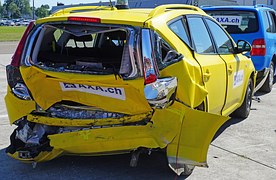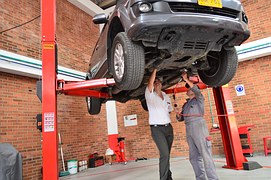Can Use The Other Driver’s Insurance To Fix My Car? Do I Have To Use My Insurance?
I Attorney Eric T. Kirk have noted elsewhere, and it should probably go without saying, that if someone, through an act of their own negligence, causes an automobile accident, then that individual, or their insurance company, is going to be responsible for all damages that result from that accident. These losses, or damages, would include the repair of any property damaged.
Generally you will have the option to use your own insurance, or the at-fault driver’s insurance for car repair.
Although other types of damage may certainly result, the typical. most common component of property damage one sees after a car accident is, of course, the repair of a car. There are typically two paths that this type of property damage claim can take.
- One is the payment of the cost to repair the damage done to the vehicle. This is fairly straightforward. An estimate of repairs is compiled by a shop or mechanic. The car is fixed. An insurance company pays the bill.
- The second scenario is one in which the cost of repair comes close to, or exceeds, the fair market value of the car. When this occurs the car is said to be a “total loss”, and the measure of damage is the fair market value of that car in an undamaged condition, i.e. what that car would have sold for- taking into account the age of the vehicle, the condition of the vehicle, and other market factors.
Note that the measure of damages is not a new car, a replacement car, or the replacement of a similar car. The measure of damage in this situation is the fair market value of the car. In other words, what you could have sold your car for on the day before the accident. No matter in which of these two scenarios you find yourself, the inevitable question that arises in the wake of a Maryland car wreck with property damage involves who bears responsibility for repairs.
Most people believe, rightly, that the at-fault person’s insurance should pay to fix the car- and of course they’re correct.
However, there are some practical concerns that come in to play. Certainly, waiting for an insurance company for an at-fault driver to evaluate liability, and otherwise adjust the claim, is an option.

If you choose this option, you need to be prepared for the possibility of some waiting time. It’s not unusual for an insurance company to take two weeks to 30 days to evaluate liability- if liability is in question- to arrange to have your car appraised or inspected, to have an estimate done, then ultimately to have the repairs done. It can be frustrating, and car accident attorneys see it everyday. Particularly where the vehicle is not driveable, and rental expenses are accumulating. As highlighted above, you will have the choice to utilize your own insurance for repairs. This second option, which is often more palatable to many individuals, is to file a claim under their own collision coverage for repairs. This is typically a more streamlined process, and a significantly faster one. Generally, in this scenario, your insurance company will pay for the repairs to your car. They then will have what’s known as a subrogation claim against the at-fault driver and their insurance company for the money they have spent. These cases are typically resolved through arbitration between the carriers.
The downside to this option: your insurance company is generally going to want you to pay a deductible up front.
Now, if your insurance company is successful in arbitration, they may well recoup your deductible for you, but you’re still out of pocket those funds, at least for a while. The valuation of a car is another issue that arises frequently after a car accident where a vehicle is determined to be a total loss.

This is frequently the case with older automobiles that are involved in significant collisions. Many people are shocked to learn that their vehicle may only be worth $1,000 or $2,000,in terms of market value, although it may be worth far more to them. If one disagrees with what the other party’s insurance company determines to be the fair market value of the vehicle, the only real option is to go to court hire an appraiser to serve as an expert witness, and ask a judge or a jury to determine the value of the vehicle. On the other hand, if you disagree with your own insurance company about the value of your vehicle, most insurance policies have an appraisal provision. Under these arrangements, you would select an appraiser, the insurance company would select an appraiser, and, if they could not agree on the value of the car, then a tiebreaker or an umpire may be selected to set the value of the car. Many appraisers charge $400 or more for an appraisal. Of course, this whole discussion is premised on the notion that you actually have collision coverage on a vehicle. Many people refer to this in Maryland as “full” coverage. There are some practical reasons why someone may not decide to carry collision coverage.
- Economic: It simply costs more to “fully” insure a car with collision coverage, which is not mandatory, than it does to carry only the state-mandated minimum coverage.
- Practical: If you have an aged car, not yet an antique, but close, without great market value, you may make a business decision to accept the risk of loss in lieu of paying collision coverage premiums.
A seasoned car accident attorney can often provide some guidance on how to best handle your property damage claim. The best automobile accident and injury attorneys in Baltimore will also have a few tricks, picked up over years of handling these claims, that can assist you in maximizing your property damage recovery.



